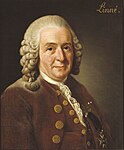Carl Linnaeus (Swedish original name Carl Nilsson Linnæus, 23 May 1707 – 10 January 1778), also known after his ennoblement as ⓘ, was a Swedish botanist, physician, and zoologist, who laid the foundations for the modern scheme of binomial nomenclature. He is known as the father of modern taxonomy, and is also considered one of the fathers of modern ecology. Many of his writings were in Latin, and his name is rendered in Latin as Carolus Linnæus (after 1761 Carolus a Linné).
Linnaeus was born in the countryside of Småland, in southern Sweden. He studied at Uppsala University, and began giving lectures in botany there in 1730. He lived abroad between 1735 and 1738, where he studied and also published a first edition of his Systema Naturae in the Netherlands. He then returned to Sweden, where he became professor of botany at Uppsala. In the 1740s, he was sent on several journeys through Sweden to find and classify plants and animals. In the 1750s and 1760s, he continued to collect and classify animals, plants, and minerals, and published several volumes.
At the time of his death, Linnaeus was one of the most acclaimed scientists in Europe. Jean-Jacques Rousseau sent him the message: "Tell him I know no greater man on earth." Johann Wolfgang von Goethe wrote: "With the exception of Shakespeare and Spinoza, I know no one among the no longer living who has influenced me more strongly." August Strindberg wrote: "Linnaeus was in reality a poet who happened to become a naturalist". Linnaeus has also been called Princeps botanicorum (Prince of Botanists), "The Pliny of the North," and "The Second Adam".
